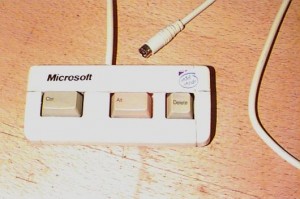Operating systems and programming style
A few days ago, I was editing a program in WebSphere, the IBM-supplied Windows programming environment. I was scrolling the screen when, without warning, the program died. I was presented with the disappearance of WebSphere, replaced by a message box: “Eclipse” in the Windows header line, followed by the message line “JVM terminated. Exit code=8096.” This was followed by informative details like “Xquickstart” | “Xms40m” |, “Xmx768m”,… I’m sure you get the picture. Thirty-one lines of error message. To anyone but someone in tech support at WebSphere HQ, totally useless. And if you did a print screen and found an e-mail address to send it to, their first response would be, “What exactly were you doing when it happened?” and the second would be “Could you replicate your error?”; since I wasn’t logging my keystrokes, just doing my job, all I could tell them was “Scrolling my screen” and “No.”
But this is getting to be a bit of a rant. What I really want to mention is how my background affected my reaction.
I started on an IBM System/3, then graduated to a System/34, then System/36, then AS/400. IBM midrange all the way. All of these systems were rock solid. Probably no computer user who has not worked on one of them (except perhaps mainframe people) can appreciate this. In almost 30 years of experience, I have NEVER had a system go belly-up on me. No blue screens of death. No “Illegal operation” errors. If a program crashed, it was because I or some other programmer had made a mistake, and the system usually told me very clearly the source of the error. No “exit code=7096″. If it gave you a message code, it also told you what the code message said.
And even Unix people, users of the other supposedly rock-solid operating system, have no reason to be smug. For example, I remember working with a Unix guy on a project that involved running RPG on a Unix box. In the course of his work, at one point, his cursor disappeared (!) Not dismayed, he entered: “tty” (and remember, he couldn’t see what he was typing), hit a control key combination, then “sane” (Cute. The keyboard was insane, and he would restore its sanity.) . And it worked. On the IBM midrange, such shenanigans were unnecessary. You never lost your cursor. And as for Linux, there have been countless times, while I was working in Linux, that the system locked up when I wasn’t doing anything more than what any other normal, non-technical user might be doing.
When you work on operating systems like the Midrange boxes had, you get spoiled. And, I have found, your programming style is affected. It may be the old batch processing mentality getting involved here, but if you have been a long-time user, you tend to be more careful. My Unix friend was of the sort that would throw together code on the fly and immediately run it, without any sort of desk-checking. I suppose he was of the sort that would let the debugger catch the errors, if the program didn’t show that it was wrong by crashing. I and others on my chosen platform tended to desk-check more. I feel that the more you examine your code, the less likely concealed errors will evade your notice. (And the devil-may-care problem solving process seems to be an issue with programmers of both Windows and Unix background.) Maybe it was better that debugging facilities in early RPG were so lousy- you inserted a temporary DEBUG opcode into your calculations.
I guess when you are on the Midrange, you are less tolerant of casual errors. When your operating system spontaneously self-destructs, you are not overly concerned when your program you wrote self-destructs. Just hit Ctl-Alt-Delete, and everything will be okay.
I know I probably haven’t proven that Midrange programmers (and by extension RPG programmers, since most Midrange programmers write RPG ![]() ) are better than programmers on other systems. I probably didn’t prove much of anything. All I know was that my fellow programmers knew exactly what I was talking about when I did a print screen of my Web-Sphere message and gave them a printed copy with my caption: “The difference between the AS/400 and a PC.”
) are better than programmers on other systems. I probably didn’t prove much of anything. All I know was that my fellow programmers knew exactly what I was talking about when I did a print screen of my Web-Sphere message and gave them a printed copy with my caption: “The difference between the AS/400 and a PC.”
